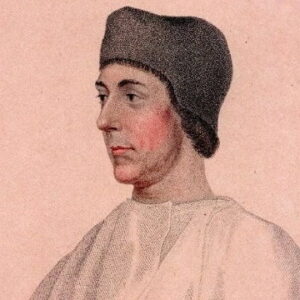John Colet was an English priest, theologian, scholar, and pioneer in the field of education. He is credited with being a major force in the late 15th and early 16th centuries promotion of Renaissance humanism and culture in England. Sir Henry Colet, his father, was a merchant and had served as Lord Mayor of London twice (1486 and 1495). Sir Henry had twenty-one additional children in addition to John, but none of them reached adulthood. John attended St. Anthony’s School before earning an M.A. from Oxford’s Magdalen College. After graduating from Oxford, he spent three years studying civil and canon law in France and Italy before returning to England to be ordained a deacon and then a priest. Colet was appointed a lecturer at Oxford University, where he primarily lectured on St. Paul’s epistles. He despised the traditional scholastic method of interpretation and application, believing that it failed to instill in readers a sense of humanism, and preferred to pay close attention to the context of St. Paul’s letters. He left Oxford to become dean of St. Paul’s Cathedral in London and, with the money he inherited, founded the St. Paul’s School nearly a decade later. The school was founded in London and continues to be one of the leading institutions in the country today.
Childhood & Adolescence
John Colet was born in 1467 in London as Sir Henry Colet’s eldest son. His father was a prosperous merchant who served as Lord Mayor of London twice (1486 and 1495). John had twenty-one siblings, but none survived to adulthood.
Following his education at St. Anthony’s School, he earned an M.A. from Magdalen College, Oxford, in 1490. In 1493, he traveled to France and Italy for three years to study canon and civil law, patristics, and the fundamentals of Greek.
While living abroad, he met Budaeus (Guillaume Budé) and Erasmus and developed a special interest in Savonarola’s teachings. His brief sojourn to Rome enhanced his cultural and spiritual encounters.
Career of John
John Colet benefited from numerous preferments as a result of his family’s influence. He was appointed non-residential rector of Dennington and Suffolk, vicar of St. Dunstan’s and Stepney, and rector of Thurning, Hunts.
He was ordained a deacon in 1497 and a priest the following year. In 1498, he became a lecturer at Oxford, where he primarily lectured on Saint Paul’s epistles.
As a lecturer, he rejected the conventional reading and application of the epistles’ text. He believed that the text should be read only after an understanding of Saint Paul’s personality.
He invited Desiderius Erasmus, a brilliant northern Renaissance humanist, to Oxford. Erasmus was taken aback by Colet’s teaching style (which corresponded to the concept of Renaissance humanism), and the two formed a close friendship.
With additional Bible-teaching lectures, he gained more influence and respect among the era’s leading humanists, including Sir Thomas More and Thomas Linacre.
He was already prebendary of York (1494) and canon of St. Martin le Grand, London, when the Church appointed him prebendary of Salisbury (1502) and prebendary of St. Paul’s Cathedral (1503). (1505).
He received a doctorate in divinity in 1504 and was appointed dean of St. Paul’s Cathedral in 1505. He served as dean until 1519, during which time he lectured on biblical teachings. His preaching, administration, and education resulted in the (humanistic) reformation of the Church.
He inherited a sizable fortune in 1508, and in 1509 founded St. Paul’s School, which later became the first English school to teach Greek. Erasmus wrote the school’s textbooks, and the Mercers’ Company was tasked with managing the school and its revenues.
He was appointed rector of the guild of Jesus at St. Paul’s Cathedral and maintained his outspoken criticism of the Church’s teachings during his tenure. People complained to William Warham (then Archbishop of Canterbury) about Colet’s heretical religious views, but the Archbishop took no legal action against him.
John Colet preached numerous sermons against the French War to King Henry VIII, but the king did not arrest or prosecute him. Rather than that, he later appointed him as his chaplain.
In 1512, he delivered his most famous and significant sermon at the London Cathedral to inaugurate the convocation of the clergy of Canterbury province. He pleaded with the clergymen in his speech to discuss the Church’s reformation and to refrain from creating new laws (of the Church), but to faithfully follow the older ones.
He condemned the state’s intention to wage war on France and stated that the same intention and power should be used to improve one’s own and community’s lives in order to bring them closer to Jesus Christ.
Significant Works
John Colet is frequently remembered for founding St. Paul’s School in 1509 on a 43-acre (at the time, the largest school plot in England) plot near the River Thames with money he inherited. It was the first English school to teach Greek without charging tuition, demonstrating Colet’s humanist nature.
Personal History and Legacies
On 10 September 1519, John Colet died of sweating sickness. On the south aisle of the choir of the cathedral church of Saint Paul, which was destroyed in the Great Fire of London, a monument was erected in his honor.
Colet Gardens, a street in Hammersmith, London, and the John Colet School in Wendover, Buckinghamshire, are named in his honor.
Estimated Net Worth
The net worth of John is unknown.


